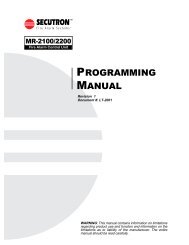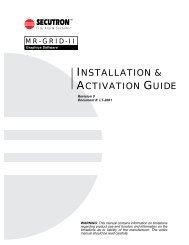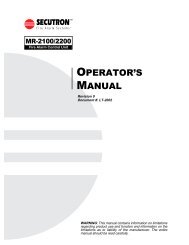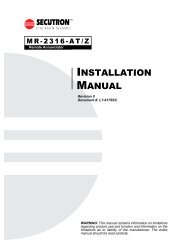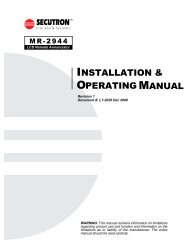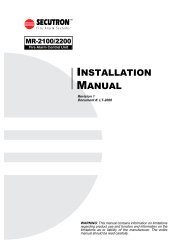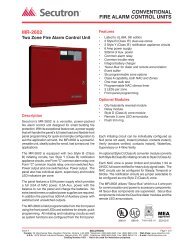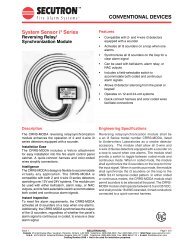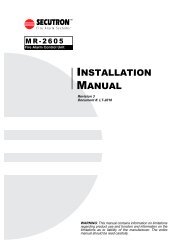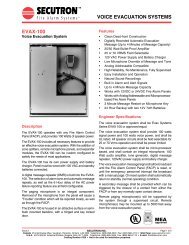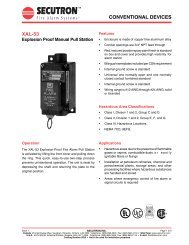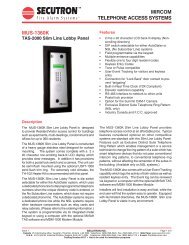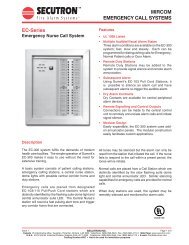MR-2300-LCD Remote Annunciator - Secutron
MR-2300-LCD Remote Annunciator - Secutron
MR-2300-LCD Remote Annunciator - Secutron
You also want an ePaper? Increase the reach of your titles
YUMPU automatically turns print PDFs into web optimized ePapers that Google loves.
Warranty and Warning Information<br />
7.0 Warranty and Warning Information<br />
7.1 Warning Please Read Carefully<br />
i<br />
Note to End UsersThis equipment is subject to terms and conditions of sale as follows<br />
7.2 Note to Installers<br />
This warning contains vital information. As the only individual in contact with system users, it is<br />
your responsibility to bring each item in this warning to the attention of the users of this<br />
system. Failure to properly inform system end-users of the circumstances in which the system<br />
might fail may result in over-reliance upon the system. As a result, it is imperative that you<br />
properly inform each customer for whom you install the system of the possible forms of failure.<br />
7.3 System Failures<br />
This system has been carefully designed to be as effective as possible. There are<br />
circumstances, such as fire or other types of emergencies where it may not provide protection.<br />
Alarm systems of any type may be compromised deliberately or may fail to operate as<br />
expected for a variety of reasons. Some reasons for system failure include:<br />
7.3.1 Inadequate Installation<br />
A Fire Alarm system must be installed in accordance with all the applicable codes and<br />
standards in order to provide adequate protection. An inspection and approval of the initial<br />
installation, or, after any changes to the system, must be conducted by the Local Authority<br />
Having Jurisdiction. Such inspections ensure installation has been carried out properly.<br />
7.3.2 Power Failure<br />
Control units, smoke detectors and many other connected devices require an adequate power<br />
supply for proper operation. If the system or any device connected to the system operates<br />
from batteries, it is possible for the batteries to fail. Even if the batteries have not failed, they<br />
must be fully charged, in good condition and installed correctly. If a device operates only by<br />
AC power, any interruption, however brief, will render that device inoperative while it does not<br />
have power. Power interruptions of any length are often accompanied by voltage fluctuations<br />
which may damage electronic equipment such as a fire alarm system. After a power<br />
interruption has occurred, immediately conduct a complete system test to ensure that the<br />
system operates as intended.<br />
7.3.3 Failure of Replaceable Batteries<br />
Systems with wireless transmitters have been designed to provide several years of battery life<br />
under normal conditions. The expected battery life is a function of the device environment,<br />
usage and type. Ambient conditions such as high humidity, high or low temperatures, or large<br />
temperature fluctuations may reduce the expected battery life. While each transmitting device<br />
has a low battery monitor which identifies when the batteries need to be replaced, this monitor<br />
16



